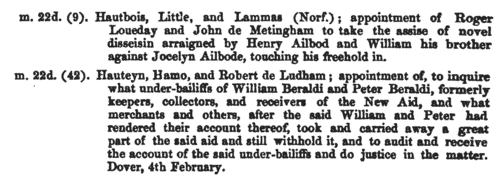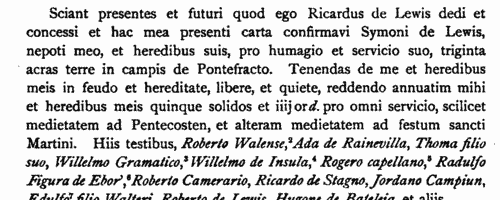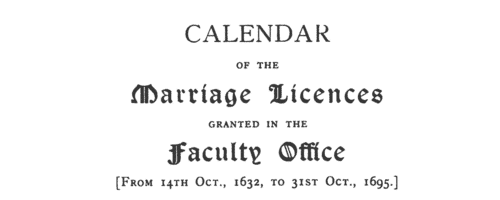Flanders Surname Ancestry ResultsOur indexes 1000-1999 include entries for the spelling 'flanders'. In the period you have requested, we have the following 111 records (displaying 1 to 10): Single Surname Subscription | | | Buying all 111 results of this search individually would cost £648.00. But you can have free access to all 111 records for a year, to view, to save and print, for £100. Save £548.00. More... |
These sample scans are from the original record. You will get scans of the full pages or articles where the surname you searched for has been found. Your web browser may prevent the sample windows from opening; in this case please change your browser settings to allow pop-up windows from this site. Deeds from Bath in Somerset
(1250-1259)
More than 500 mediaeval deeds survived in the muniment chest of Bath in Somerset, almost all dealing with the transfers of small plots of land in the city. Each names the grantor and grantee, describes the land, and is witnessed by other citizens. This printed edition was prepared by the Reverend C. W. Shickle, Master of St John's Hospital in Bath. Where (as in many cases) the earliest deeds were undated, he was able to assign periods to each on the basis of style and content, particularly the names of witnesses. FLANDERS. Cost: £4.00.  | Sample scan, click to enlarge

| Patent Rolls
(1277-1278)
Calendars of the patent rolls of the reign of king Edward I are printed in the Calendars of State Papers: but these cover only a fraction of the material on the rolls. From 1881 to 1889 the reports of the Deputy Keeper of the Public Record Office also include calendars of other material from the rolls - about five times as many entries as in the State Papers - predominantly mandates to the royal justices to hold sessions of oyer and terminer to resolve cases arising locally; but also other general business. The calendar for the 6th year of king Edward I [20 November 1277 to 19 November 1278], hitherto unindexed, is covered here.FLANDERS. Cost: £6.00.  | Sample scan, click to enlarge

| Grantees of offices, commissions and pardons
(1272-1281)
The Patent Rolls are the Chancery enrolments of royal letters patent. Those for the 1st to the 9th years of the reign of king Edward I (29 November 1272 to 17 November 1281) were edited for the Public Record Office by J. G. Black, and published in 1901. The main contents are royal commissions and grants; ratifications of ecclesiastical estates; writs of aid to royal servants and purveyors; and pardons. FLANDERS. Cost: £2.00.  | Sample scan, click to enlarge

| Pontefract Cartulary
(1100-1300)
The Cluniac monastery of St John the Evangelist at Pontefract (Pomfret) in the West Riding of Yorkshire, was founded in the 11th century by Robert de Lascy. The grants of land made to the priory from then well into the 13th century were copied into a cartulary or chartulary which eventually came to Godfrey Wentworth of Woolley Park. This was edited by Richard Holmes and published by Yorkshire Archaeological Society in 1899 and 1902. The individuals named are mainly local landowners and tenants, canons, servants and wellwishers of the monastery. The charters before 1250 are often undated: the numbering of the charters is modern, and amounts to 561. The cartulary itself contains 11 fasciculi, to which Holmes gave these section names - I. The Seigniorial Charters; II. The Ecclesiastical Charters; III. Royal Charters and Confirmations; IV. The Local Charters (Pontefract &c.); V. The Ledstone Charters; VI. The Ledsham Charters; VII. Miscellaneous Charters; VIII. The Peckfield and other Charters; IX. and X. Scarborough and other Charters; and XI. Leases to Tenants. Ledston(e), Ledsham and Peckfield are all close to Pontefract, as is most of the property.FLANDERS. Cost: £4.00.  | Sample scan, click to enlarge

| London Marriage Allegations
(1611-1660)
London, Essex and part of Hertfordshire lay within the diocese of London. In the later 17th century the individual archdeaconry courts issued marriage licences, but for this period the only surviving material is from the overarching London Consistory court. The main series of marriage allegations from the consistory court was extracted by Colonel Joseph Lemuel Chester, and the text was edited by George J. Armytage and published by the Harleian Society in 1887. A typical later entry will give date; name, address and occupation of groom; name, address and condition of his intended bride, and/or, where she is a spinster, her father's name, address and occupation. Lastly we have the name of the church where the wedding was going to take place. For the later years Colonel Chester merely picked out items that he thought were of interest, and his selections continue as late as 1828, but the bulk of the licences abstracted here are from the 17th century.FLANDERS. Cost: £4.00.  | Sample scan, click to enlarge

| Suffolk householders
(1674)
Hearth tax was raised by assessing each householder on the number of chimneys to the dwelling. This provided a simple way to make a rough judgment as to the value of the dwelling: paupers were issued exemption certificates, but they too were listed at the end of each return. The returns were made by township, grouped by hundred. A complete copy of the hearth tax return for each shire was sent to the Exchequer: this is the return for Suffolk for Lady Day (25 March) 1674 (E 179/257/14) as printed in 1905 as Suffolk Green Book no xi, vol. 13. The numbers given are the numbers of hearths: where two or more people are grouped together with one number, it may be assumed that they were heads of separate households sharing a single building with that number of chimneys.FLANDERS. Cost: £6.00.  | Sample scan, click to enlarge

| Hertfordshire Sessions
(1658-1700)
Incidents from the Hertfordshire Sessions Books and Minute Books. These cover a wide range of criminal and civil business for the county: numerically, the the most cases (759) concerned not attending church; presentments about repairs to roads and bridges (247); unlicensed and disorderly alehouses (226); assault (156); badgers, higlers, &c., trading without licence (142); and trading without due apprenticeship (117). This calendar gives abstracts of all entries in the Sessions Books and Minute Books for Hertfordshire sessions for the period.FLANDERS. Cost: £4.00.  | Sample scan, click to enlarge

|  Apprentices registered at York
(1712-1713) Apprentices registered at York
(1712-1713)
Apprenticeship indentures and clerks' articles were subject to a 6d or 12d per pound stamp duty: the registers of the payments usually give the master's trade, address, and occupation, and the apprentice's father's name and address, as well as details of the date and length of the apprenticeship. There are central registers for collections of the stamp duty in London, as well as returns from collectors in the provinces. These collectors generally received duty just from their own county, but sometimes from further afield. January 1712 to June 1713. (The sample entry shown on this scan is taken from a Norfolk return)FLANDERS. Cost: £8.00.  | Sample scan, click to enlarge

| Licences for marriages in southern England
(1632-1714)
The province or archbishopric of Canterbury covered all England and Wales except for the northern counties in the four dioceses of the archbishopric of York (York, Durham, Chester and Carlisle). Marriage licences were generally issued by the local dioceses, but above them was the jurisdiction of the archbishop. Where the prospective bride and groom were from different dioceses it would be expected that they obtain a licence from the archbishop; in practice, the archbishop residing at Lambeth, and the actual offices of the province being in London, which was itself split into myriad ecclesiastical jurisdictions, and spilled into adjoining dioceses, this facility was particularly resorted to by couples from London and the home counties, although there are quite a few entries referring to parties from further afield. Three calendars of licences issued by the Faculty Office of the archbishop were edited by George A Cokayne (Clarenceux King of Arms) and Edward Alexander Fry and printed as part of the Index Library by the British Record Society Ltd in 1905. The first calendar is from 14 October 1632 to 31 October 1695 (pp. 1 to 132); the second calendar (awkwardly called Calendar No. 1) runs from November 1695 to December 1706 (132-225); the third (Calendar No. 2) from January 1707 to December 1721, but was transcribed only to the death of queen Anne, 1 August 1714. The calendars give only the dates and the full names of both parties. Where the corresponding marriage allegations had been printed in abstract by colonel Joseph Lemuel Chester in volume xxiv of the Harleian Society (1886), an asterisk is put by the entry in this publication. The licences indicated an intention to marry, but not all licences resulted in a wedding. FLANDERS. Cost: £4.00.  | Sample scan, click to enlarge

|  Masters and Apprentices
(1720) Masters and Apprentices
(1720)
Apprenticeship indentures and clerks' articles were subject to a 6d or 12d per pound stamp duty: the registers of the payments usually give the master's trade, address, and occupation, and the apprentice's father's name and address, as well as details of the date and length of the apprenticeship. 1 January to 3 September 1720.FLANDERS. Cost: £8.00.  | Sample scan, click to enlarge

|
Research your ancestry, family history, genealogy and one-name study by direct access to original records and archives indexed by surname.
|













